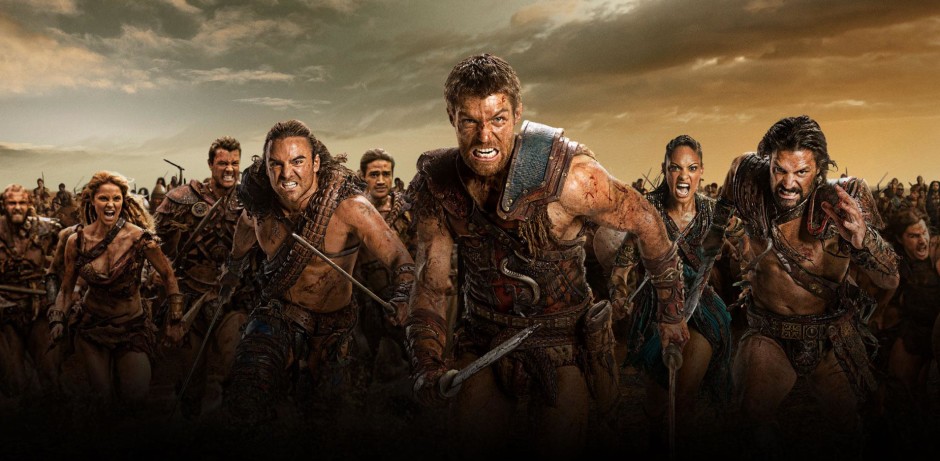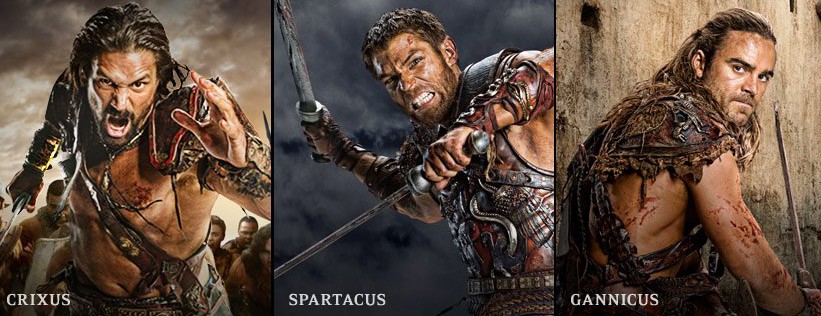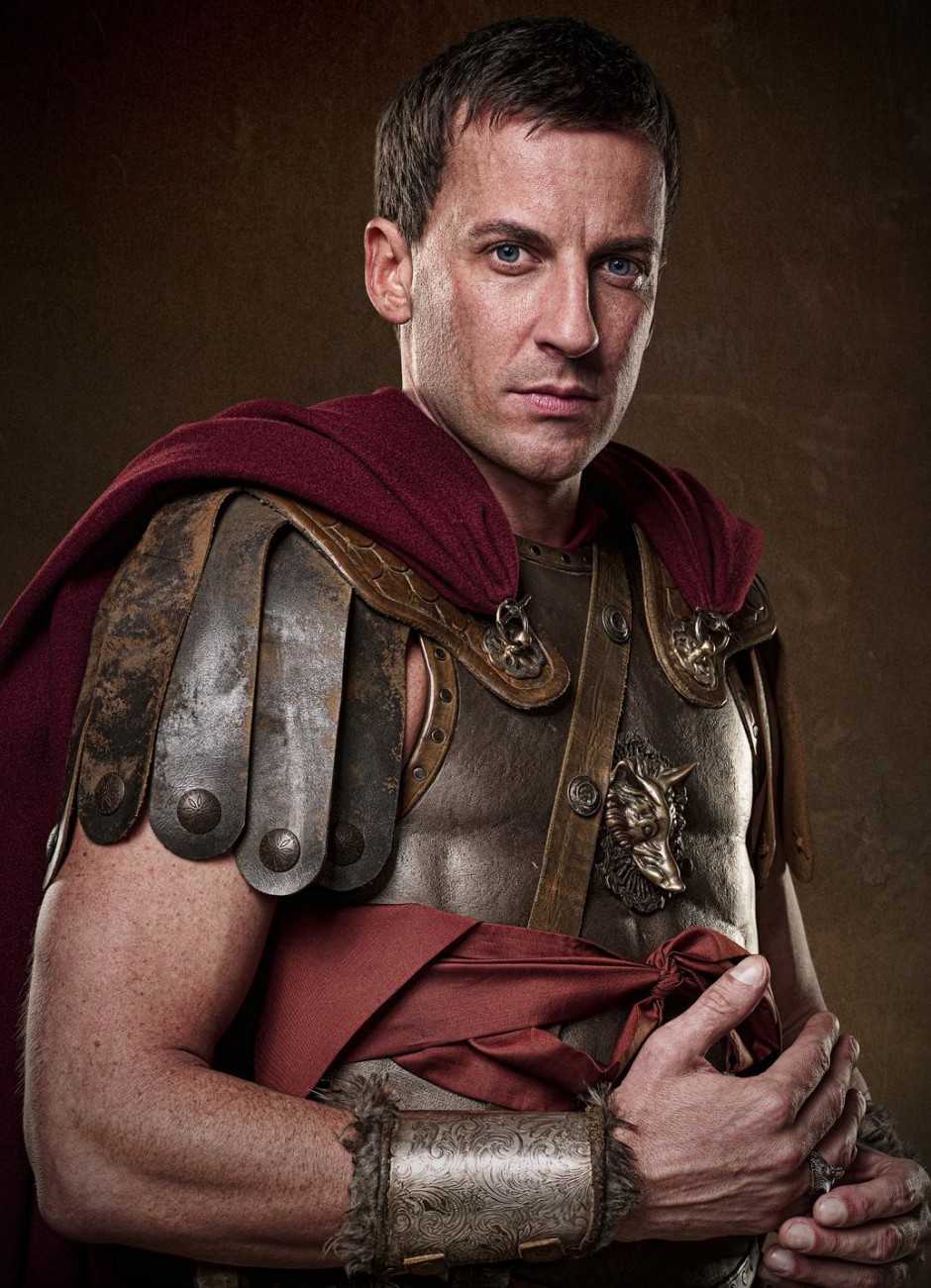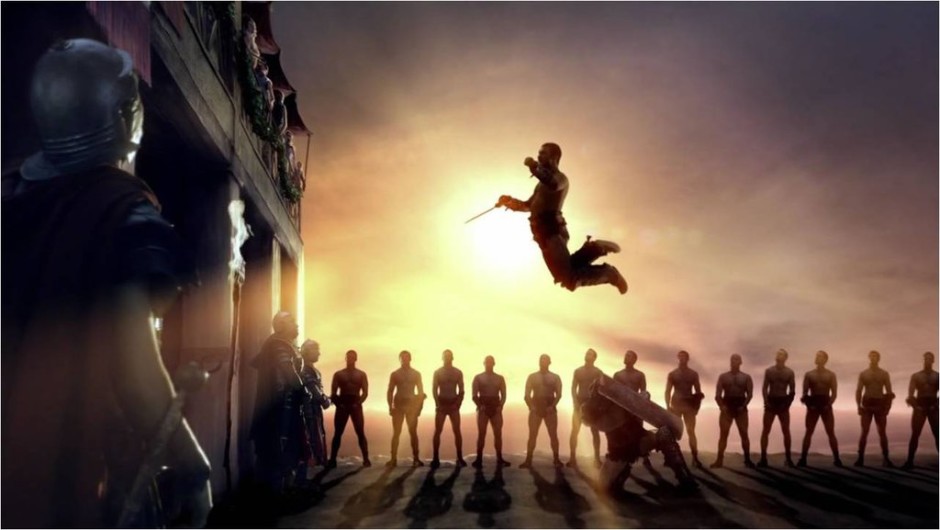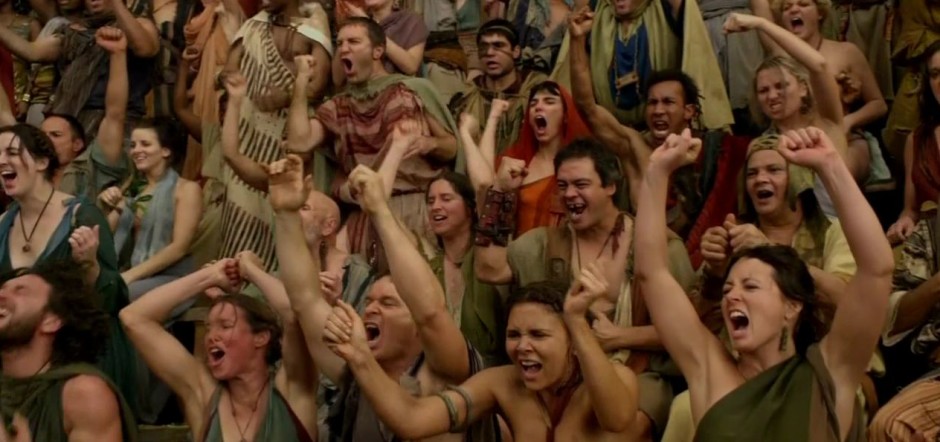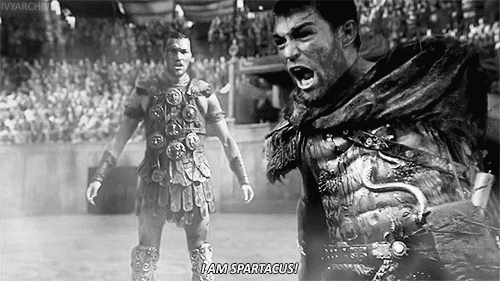My personal tastes in entertainment are as eclectic as they come. War epics, superhero comics, horror films, classic literature––I don’t discriminate as long as there’s an exciting, memorable story at the core. After releasing my debut fantasy novel, Fall From Grace, I have been reflecting on the numerous works that have inspired my career as a screenwriter and novelist. There’s a vast difference between inspiration and obsessive fandom. A source of inspiration fuels your mind to create your own stories unique to your talents, not to replicate the art of those whom you admire. Whether it’s film, books or music, literally anything that you enjoy can push you to be better. Few works have had such a direct and motivating influence on my career as Steven S. DeKnight’s television series, Spartacus. Produced by Sam Raimi and Robert Tapert, Spartacus is the rare instance where a perfect storm of cinematic and narrative elements combined in a maelstrom of everything that I love about storytelling.
WARNING – This article contains SPOILERS for the entire series
A Tale of Great and Unfortunate Things
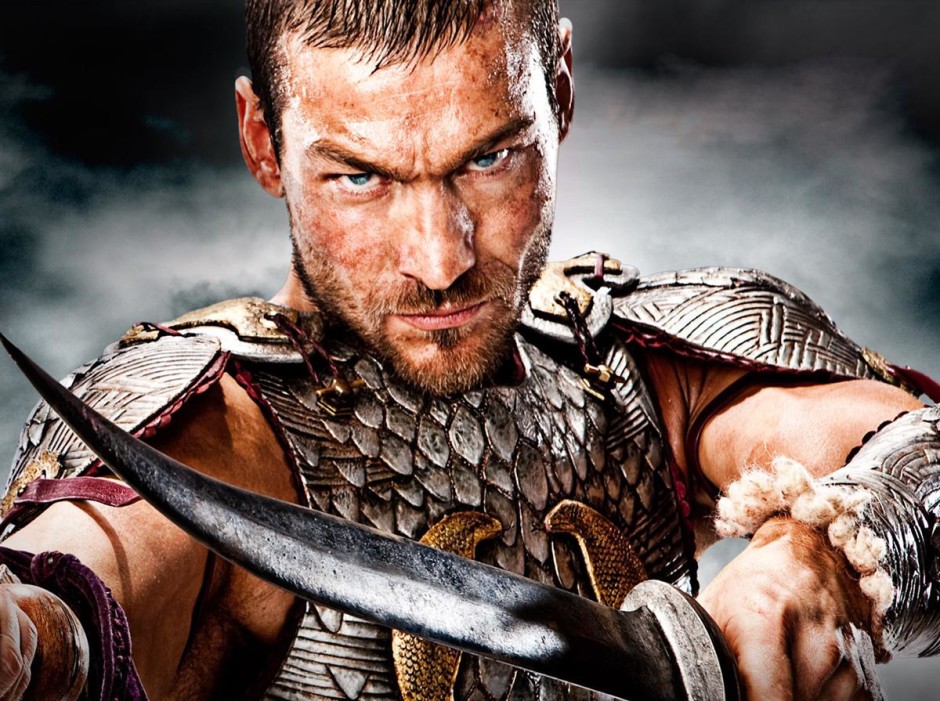 Spartacus is the story of the rise, trials and tribulations, and fall of a classic, mythic hero. A character as iconic and eternal as those in any Greek myth or Biblical parable. Spartacus (played first by Andy Whitfield and then Liam McIntyre after Whitfield’s tragic passing) is a Thracian warrior who pledges his blade to the Roman army in exchange for the eradication of Thrace’s enemies only to have Legatus Claudius Glaber (Craig Parker) betray his word. His wife is stolen from their bed, taken into slavery, and Spartacus is set to be executed ad Gladium. Defying the odds, Spartacus defeats all of his executioners and is sent to the ludus (gladiator school) of Quintus Lentulus Batiatus (John Hannah) in Capua. Batiatus promises to locate Spartacus’ wife if he obeys him as dominus and fights for the glory of House Batiatus. Spartacus rises through the gladiatorial ranks, becoming the legendary Bringer of Rain, but further betrayal and tragedy sends him down a path destined to be etched in the pages of history.
Spartacus is the story of the rise, trials and tribulations, and fall of a classic, mythic hero. A character as iconic and eternal as those in any Greek myth or Biblical parable. Spartacus (played first by Andy Whitfield and then Liam McIntyre after Whitfield’s tragic passing) is a Thracian warrior who pledges his blade to the Roman army in exchange for the eradication of Thrace’s enemies only to have Legatus Claudius Glaber (Craig Parker) betray his word. His wife is stolen from their bed, taken into slavery, and Spartacus is set to be executed ad Gladium. Defying the odds, Spartacus defeats all of his executioners and is sent to the ludus (gladiator school) of Quintus Lentulus Batiatus (John Hannah) in Capua. Batiatus promises to locate Spartacus’ wife if he obeys him as dominus and fights for the glory of House Batiatus. Spartacus rises through the gladiatorial ranks, becoming the legendary Bringer of Rain, but further betrayal and tragedy sends him down a path destined to be etched in the pages of history.
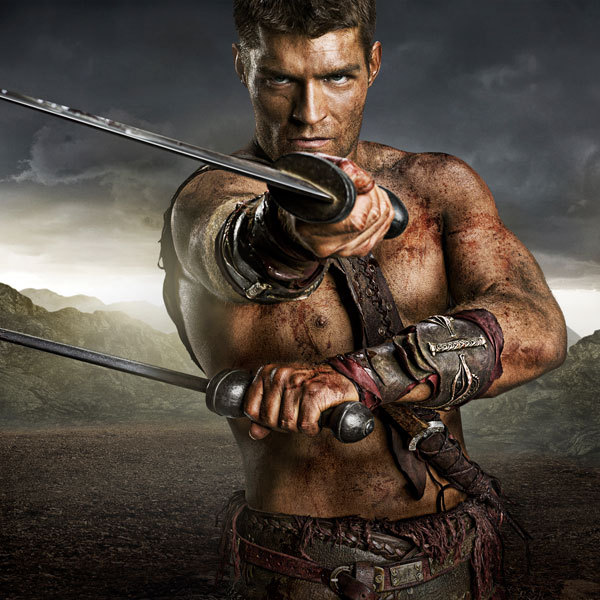 The current state of television is shifting towards a “postnarrative” form of storytelling. The classical structure of dramatic arcs established as far back as the works of Aristotle are now being jettisoned in favor of a more non-linear emphasis on in-the-moment world exploration, juggling as many characters and plot threads as possible. This method can be engaging, but the shows often write themselves into a corner and can’t appease their fanbase’s eventual demand for satisfying resolutions. That is never the case with Spartacus.
The current state of television is shifting towards a “postnarrative” form of storytelling. The classical structure of dramatic arcs established as far back as the works of Aristotle are now being jettisoned in favor of a more non-linear emphasis on in-the-moment world exploration, juggling as many characters and plot threads as possible. This method can be engaging, but the shows often write themselves into a corner and can’t appease their fanbase’s eventual demand for satisfying resolutions. That is never the case with Spartacus.
As a series, Spartacus is comprised of three tight 10-13 episode seasons and a 6-episode prequel miniseries. In every season, each episode has constant forward progression for both the characters and overall arc. No time is wasted. No character is a throwaway device. When the credits roll you’ve always been given a brisk hour of entertainment where the story and characters have evolved in meaningful ways. Each season as a whole also has a clear dramatic spine for viewers to latch onto, the tension rising episode by episode to fulfill the promise of that arc. For example, Blood and Sand is the story of Spartacus’ rise as a gladiator that leads him and other slaves to break free from House Batiatus. Vengeance follows Spartacus and his band of slaves on the run from Glaber while planting the seeds of rebellion and seeking retribution. Lastly, War of the Damned has Spartacus wielding a full-on army against the might of Rome, attempting to end slavery in the empire. Even the prequel, Gods of the Arena, manages to tell the story of Batiatus’ origins as a lanista and Gannicus’ legend in the arena through but a handful of episodes. Very few shows have displayed such mastery in classical, economical, and thrilling storytelling.
How many times have you diligently watched a season of television, seeing the story build for months, only to have the final episode fizzle? That bad taste in your mouth is not easily washed. Understand that this is not hyperbole when I say that Spartacus has some of the best season finales I have ever seen. Each established hero-versus-villain clash comes to a bloody, brutal, and unrelentingly satisfying conclusion. The season arcs ends in explosive fashion, leaving every character changed…for better of for worse. Nothing is stagnant. No plot thread is left forgotten.
That is the hallmark of great television.
Iconic Heroes, Memorable Villains
The importance of a strong narrative is essential to storytelling, but even the most structured of plots means little if the characters that populate the story don’t deliver on the promised drama. For every memorable hero in Spartacus you will find an equally ambitious, dangerous, and developed villain.
A trinity of core heroes defines the good fight in Spartacus, most notably the man himself. He is an immaculate and honorable fighter, but why do others follow him on an impossible mission of freedom? One word: love. Spartacus inspires because his every action is driven by love: love for his wife, for his brothers, and for every slave suffering under the Romans. He is simultaneously the everyman and the legend that his people need to find the courage within to risk their lives for a greater purpose.
Spartacus surrounds himself with many advisors, but two stand above all others. He meets Crixus (Manu Bennett) in the ludus, a man who rose from a slave on the streets to become the Champion of Capua. He embodies and loves all that it means to be a gladiator, and Spartacus’ contempt for that tradition immediately puts them at odds. Crixus has no designs beyond the glory of the arena…until the love of a woman opens his eyes to what more life can offer. Every great hero needs the push of a rival, and Crixus is Wolverine to Spartacus’ Cyclops. Even when fighting at Spartacus’ side against the Romans, Crixus constantly challenges him, lifting them both to new heights of greatness.
Gannicus (Dustin Clare) is the show’s reluctant hero, a former Champion of Capua who earned his freedom in the arena. However, like Crixus he lived for the glory. Without it, Gannicus is a wandering fool lacking purpose, drowning his abilities in wine and women. Despite being drawn to Spartacus’ rebellion, he denies any aspirations of greatness. But the effect of Spartacus is not easily shunned. Mission after mission, Gannicus’ skills place him on a pedestal, earning him legendary status among the people. One can only run from such a calling for so long.
The deeds of great heroes are measured by the might of their adversaries. Too often in stories, villains fall into the trappings of one-note evil intentions. Humanity is rarely so easily defined. The villains of Spartacus embody the darkest aspects of the human condition, acting as rich foils to the heroes.
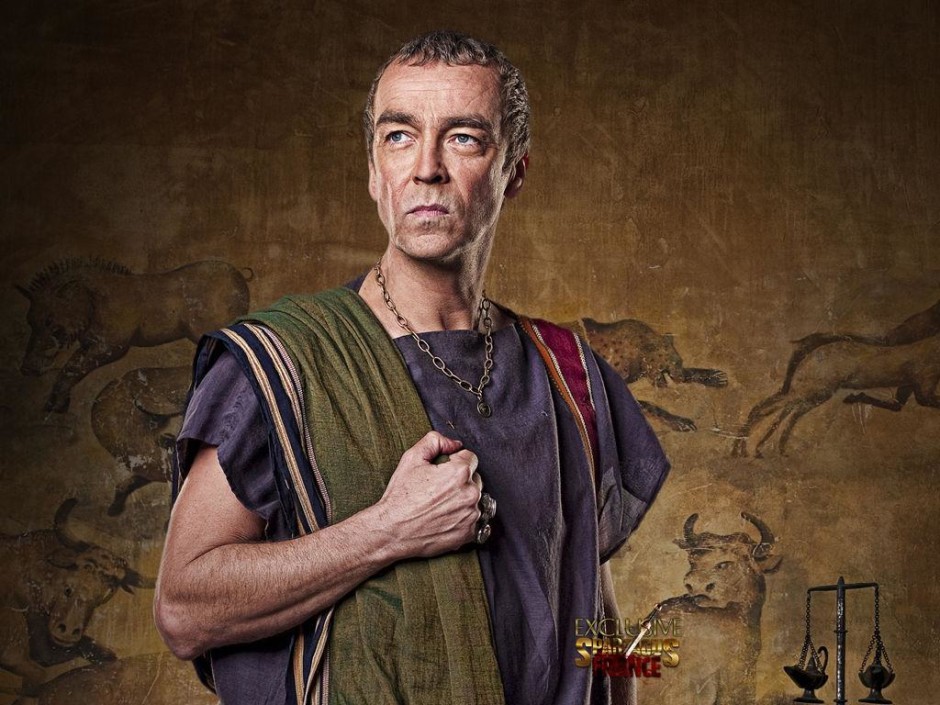 In Blood and Sand, Batiatus is a scheming, brutal dominus whose slaves are no more than tools to achieve his goals. His desire to rise above his station in life into the realm of politics is fueled by feelings of inadequacy, as his “betters” constantly remind him of his place. His ambition is blind in the worst ways, trampling over all those who would hold him down. But at the core of Batiatus’ violent, crude persona is the most admirable of qualities: love for his wife, Lucretia (Lucy Lawless). Through all their highs and lows, the pair is true soul mates. There are few things more powerful and dangerous.
In Blood and Sand, Batiatus is a scheming, brutal dominus whose slaves are no more than tools to achieve his goals. His desire to rise above his station in life into the realm of politics is fueled by feelings of inadequacy, as his “betters” constantly remind him of his place. His ambition is blind in the worst ways, trampling over all those who would hold him down. But at the core of Batiatus’ violent, crude persona is the most admirable of qualities: love for his wife, Lucretia (Lucy Lawless). Through all their highs and lows, the pair is true soul mates. There are few things more powerful and dangerous.
Glaber takes center stage as the villain of Vengeance, the very man whose actions set Spartacus on his path. Alongside his seductive and vicious wife, Ilithyia (Viva Bianca), they are everything Batiatus and Lucretia aspired to be: people of noble birth with positions of political influence. Unfortunately for Glaber, his prestige comes from the name of his father-in-law, a senator who never fails to boast that fact. Constantly embarrassed by Spartacus, Glaber’s position and sanity crumble amidst his rage to crush his rival and earn his own respect.
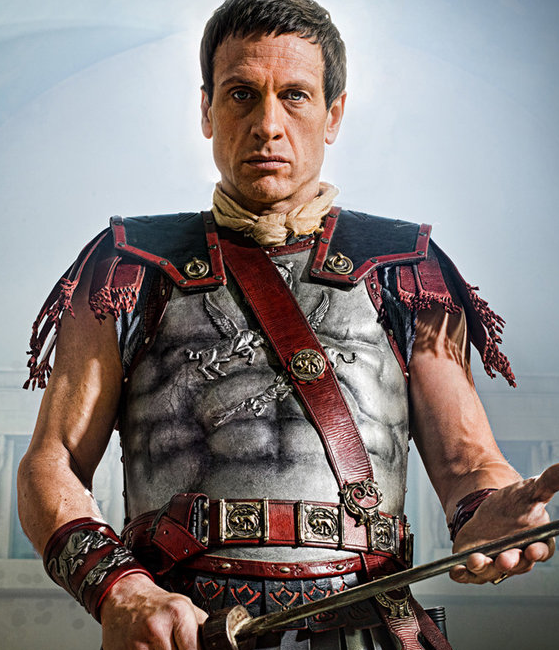 My favorite villain of the series comes in War of the Damned––Marcus Crassus (Simon Merrells). A senator and one of the richest men in Rome, he is charged with ending Spartacus’ rebellion after so many before him have failed. Crassus is the most dangerous of foes, matching (if not exceeding) Spartacus’ combat strategies and fighting skills. Where all others wrote off Spartacus as merely a slave, Crassus sees him as a man. Respects him as a man. They are two sides of the same coin, two immovable objects on a collision course to change history. Were Crassus not a Roman sent to kill Spartacus, you would be hard-pressed to even label him a villain.
My favorite villain of the series comes in War of the Damned––Marcus Crassus (Simon Merrells). A senator and one of the richest men in Rome, he is charged with ending Spartacus’ rebellion after so many before him have failed. Crassus is the most dangerous of foes, matching (if not exceeding) Spartacus’ combat strategies and fighting skills. Where all others wrote off Spartacus as merely a slave, Crassus sees him as a man. Respects him as a man. They are two sides of the same coin, two immovable objects on a collision course to change history. Were Crassus not a Roman sent to kill Spartacus, you would be hard-pressed to even label him a villain.
There are countless other amazing supporting characters on both sides of the conflict: Ashur (Nick E. Tarabay), the conniving and opportunist Syrian snake; Oenomaus (Peter Mensah), the former doctore (gladiator trainer) turned reluctant rebel; and the hotheaded German gladiator, Agron (Dan Feuerriegel). There’s no shortage of meaty roles for women either, as personified by Naevia (Lesley-Ann Brandt / Cynthia Addai-Robinson) who transforms from an abused, timid slave doomed to the mines into one of Spartacus’ most ferocious warriors. Few ensemble casts are as stacked with such beloved characters.
The Poetry of Profanity
From the very first episode, the language of Spartacus is shocking, unique, and beautiful. DeKnight describes the show’s bold approach as “Shakespeare meets Robert E. Howard.” The exquisite, melodic flow of dialogue is often peppered with apparently modern profanities that are actually rooted in history. DeKnight explains how “every single curse word you hear in Spartacus has a Latin equivalent. I had my historian give me a list of curse words and I was shocked!”
Jupiter’s cock, indeed!
“A Gladiator does not fear death. He embraces it. Caresses it. Fucks it. Each time he enters the arena, he slips his cock in the mouth of the beast and prays to thrust home before the jaws snap shut.” – Oenomaus
The effectiveness of the profanity would be dulled if every line of dialogue spewed “shit” and “fuck” with impunity, but not all characters are equally foul-mouthed. The degree of cursing is often representative of class status. Senators and other upper-class Romans temper their tongues (at least in public), indicative of their high opinions of self-worth versus that of lower citizens such as Batiatus, who is notorious for his explicit, expressive bouts of frustration. DeKnight also notes how Spartacus himself takes far more care with his language: “He’ll say “shit” and “ass,” but that’s about as far as he’ll go.”
“We shall stand fearsome Triumverate with means to bend the course of history. The past cannot be altered, the present holds but regret and loss. It is only in the days to come that a man may find solace…when memory fades.” – Marcus Crassus
The blog Et In Arcadia has a very interesting post addressing the Latin influence in the show’s dialogue. The use of choice terminology such as ludus, doctore, and dominus act as anchors to ground the viewer in the world of ancient Rome and whisk them away from modernity. An absence of definite and indefinite pronouns also creates a truncated flow to the language that evokes an ancient tone and rolls of the actors’ tongues with the fluid ease of poetry. The end result is lyrical, hilarious, obscene, and moving––often in the same conversation.
“I have done this thing because it is just. Blood demands blood. We have lived and lost at the whims of our masters for too long. I would not have it so. I would not see the passing of a brother for the purpose of sport. I would not see another heart ripped from a chest or breath forfeit for no cause. I know not all of you wish this, yet it is done. It is done. Your lives are your own. Forge your own path or join with us, and together we shall see Rome tremble.” – Spartacus
Green Screen Soaked in Crimson
Every frame of Spartacus oozes style. The production takes the green screen / studio set combination popularized in 300 and Sin City to bring ancient Rome to life. Remember that this is a television show, not a big budget movie. High praise is due to the immensely talented crew in every department for creating such a gorgeous show where each scene is a work of art. The combination of masterful cinematography, detailed set construction, and lavish costumes rivals most cinematic experiences.
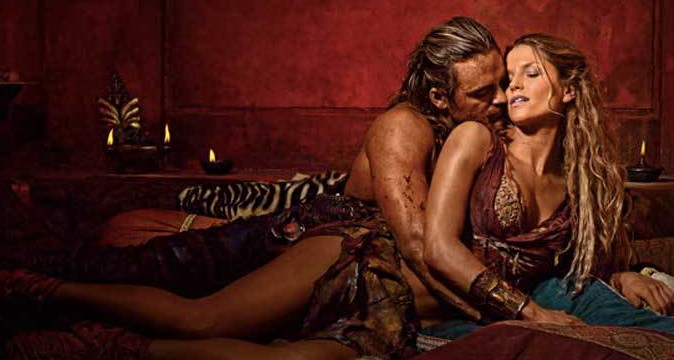 Green screen CGI extensions breathe life into the Roman landscapes, the city of Capua, the horrific slave mines, and many more rich settings. But the computer imagery only accentuates the opulence and sheer decadence of Roman culture that has been carefully crafted by master tradesmen. Whether Batiatus’ ludus or one of the many lush villas, an excess of wealth (or desire for it) contrasts the lives of slaves and masters. Excess defines all aspects of Rome, from the overt sexuality to the grisly violence of the arena.
Green screen CGI extensions breathe life into the Roman landscapes, the city of Capua, the horrific slave mines, and many more rich settings. But the computer imagery only accentuates the opulence and sheer decadence of Roman culture that has been carefully crafted by master tradesmen. Whether Batiatus’ ludus or one of the many lush villas, an excess of wealth (or desire for it) contrasts the lives of slaves and masters. Excess defines all aspects of Rome, from the overt sexuality to the grisly violence of the arena.
Wine flows as freely as blood (and other bodily fluids) in the world of Spartacus.
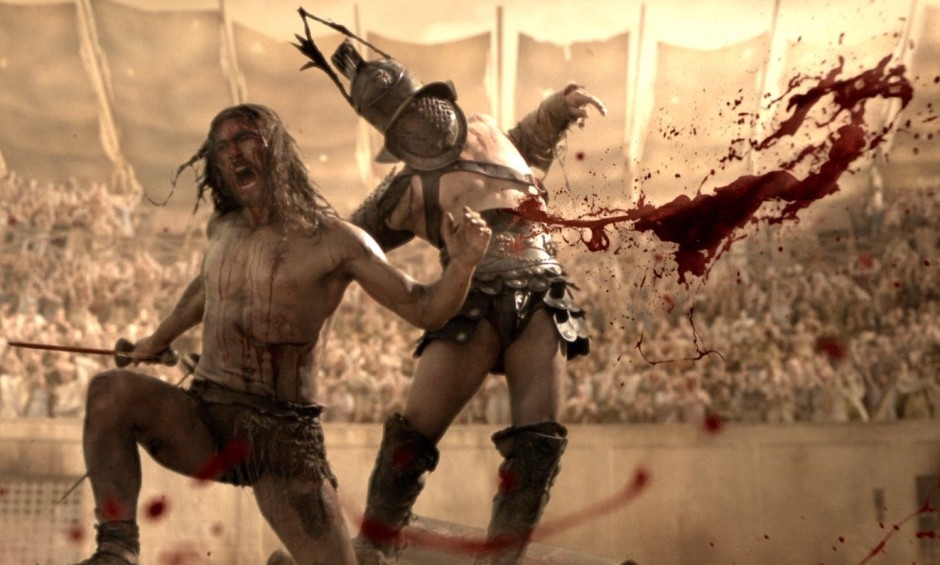 Nowhere is the style of Spartacus more readily displayed than the superb fight scenes. Top-notch choreography and deliberate use of slow motion give each gladiator battle its own brutal narrative. You fully appreciate the sheer physicality of the movements and the emotions fueling every blow. Blood flies like ribbons and spurts in crimson fountains. Limbs sever. Heads roll. Within seconds, you are transported among the rabid crowd, screaming for the deathblow. Craving it. The gore is extremely explicit yet always fitting in the moment. Later seasons depart from arena fights and explore battles between armies with thousands of warriors on each side. Despite the chaos, the focus on character is as tight as ever without devolving into crashing waves of bland CGI bodies.
Nowhere is the style of Spartacus more readily displayed than the superb fight scenes. Top-notch choreography and deliberate use of slow motion give each gladiator battle its own brutal narrative. You fully appreciate the sheer physicality of the movements and the emotions fueling every blow. Blood flies like ribbons and spurts in crimson fountains. Limbs sever. Heads roll. Within seconds, you are transported among the rabid crowd, screaming for the deathblow. Craving it. The gore is extremely explicit yet always fitting in the moment. Later seasons depart from arena fights and explore battles between armies with thousands of warriors on each side. Despite the chaos, the focus on character is as tight as ever without devolving into crashing waves of bland CGI bodies.
Is Spartacus gratuitous? Absolutely. The show isn’t for everyone, but evidence points to the Romans as having one of the most gratuitous cultures in history. If you can handle it, Spartacus is a stylized celebration of the best and worst of Roman times and its people…and I love every second of it.
Gratitude
It is a rarity to find something in life that can constantly rejuvenate the passion for your own work. Spartacus has been a fountain of youth for my creativity, preventing me from falling into the pit of stagnant complacency that threatens the talents of every artist. Simply put, I wouldn’t be the writer that I am without having experienced Spartacus. As I carve out my own legacy one word at a time, I hope that I can one day inspire others along their own path to success.
To all the cast and crew of Spartacus––you may never know who I am, but you have my utmost respect and admiration. One word says it all: gratitude.

